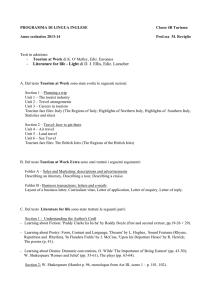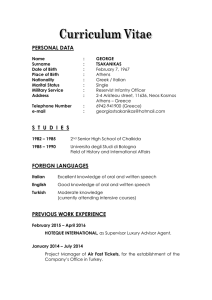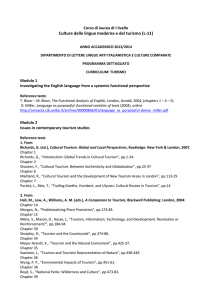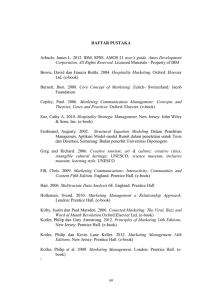Marketing in the Travel and Tourism Industry - PowerPoint
advertisement
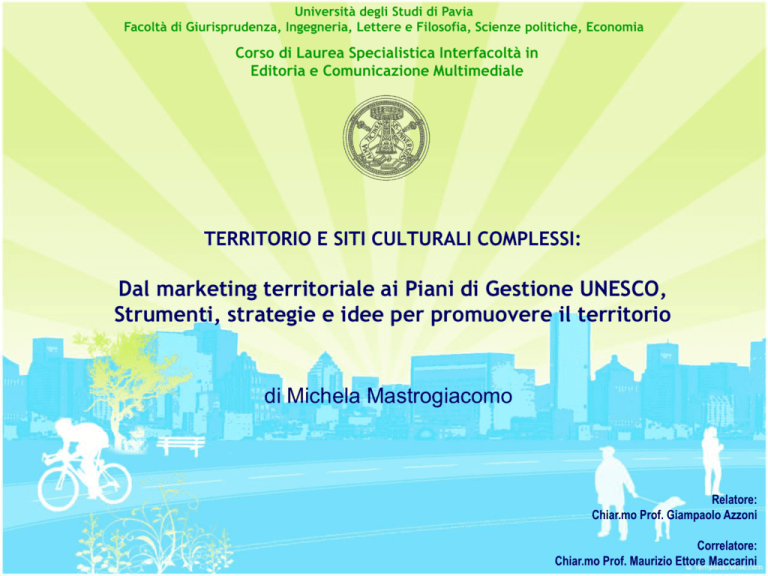
Università degli Studi di Pavia Facoltà di Giurisprudenza, Ingegneria, Lettere e Filosofia, Scienze politiche, Economia Corso di Laurea Specialistica Interfacoltà in Editoria e Comunicazione Multimediale TERRITORIO E SITI CULTURALI COMPLESSI: Dal marketing territoriale ai Piani di Gestione UNESCO, Strumenti, strategie e idee per promuovere il territorio di Michela Mastrogiacomo Relatore: Chiar.mo Prof. Giampaolo Azzoni Correlatore: Chiar.mo Prof. Maurizio Ettore Maccarini TOPICS • • • • Influence of territorial marketing on tourism Services marketing models Key players in Italian tourism industry The importance of cultural heritage and sustainability in tourism • The Unesco and his territorial approach Some little definition… • Marketing is about anticipating and identifying the wants and needs of a target market of consumers, then satisfying those needs in order to make a profit BUT… • territorial marketing can not be seen as the mere transposition of marketing management principles to the local context Marketing Research • Anticipating and identifying demands depends on effective marketing research • Research into the existing and potential market • Point out strategies to exploit the resources, so as to increase the territorial value Functions of territory-applied marketing Marketing for the development of new entrepreneurship initiatives Marketing for the reinforcement of the existing economic texture FUNCTIONS OF TERRITORIAL MARKETING Marketing for the dissemination of skills and innovation Marketing for the attraction of prospective users TERRITORIAL OPERATIONAL MARKETING Creation of conditions for an improved exploitation of the territory Interventions on the territory’s tangible and intangible components Provision of assistance to investors during and after their settlement Communication of the territory’s attractiveness factors Reinforcement and diffusion of the perception of placement Advertisement and promotion of territory exploitation opportunities The importance of SYNERGY… • Territorial marketing • Synergic action • Tourist marketing The traditional Marketing Mix: • The way in which current and potential customers’ demands are satisfied depends on the marketing mix of the organisation’s products and services. • Traditionally in the 4P elements of the mix: Elements of the Marketing Mix Product or service • Quality • Value • Lifecycle • Perishability • Differentiation • Niche Elements of the Marketing Mix Price • Seasonality • Strategies • Competitor analysis • Loss leadership • Skimming Elements of the Marketing Mix Promotion • Advertising • Endorsements • Sponsorship • Methods – use of different media, brochures/leaflets, public relations, sales promotion, press releases • To gain attention/interest/desire/action Elements of the Marketing Mix Place • Channels of distribution • Getting tourism services to customers • Retail services such as travel agents • Direct marketing through targeted mail outs • Electronic methods, such as using the Internet • The growth of technology Elements of the Marketing Mix • • • • People Employees Management Culture of organisation Attitude to customer service Elements of the Marketing Mix Planning • Mission statements • Deciding on objectives • ‘What are we trying to achieve?’ – profit, cut the competition, boost share of market, enter new markets and so on The italian “LTS” experience… • What’s a Local Tourist System? Law no. 135/01: The LTS allows the identification of more effective policy tools for managing tourism: 1. First, through the concept of LTS, the policy maker can take into account the complexity of tourism, characterised by a strong heterogeneity of goods, services and subjects involved; 2. second, LTS helps promote a stronger co-ordination between the public and the private sector, by identifying a homogeneous territory and recognising its importance in tourists' decisions; 3. third, through the LTS the policy-maker can analyze the externalities and promotes the idea of collaborating networks in a context of local development. The italian “LTS” experience… A LTS policy has to: i) co-ordinate the price policy of the different firms supplying "single components" of the tourist product; ii) fix the price of the whole product; iii) impute a price to each component. We demonstrate that, through price policy co-ordination and under general conditions, the LTS can increase the size of tourism and the firms' profits, thereby reaching a more effective and efficient target in tourism policy. The recent introduction of LTS in the Italian legislation can be seen as a positive attempt of improving co-ordination in a complex sector such as tourism. The deep impact of ICT in tourism: • Information Communication Technology relevant to tourism encompasses information search, purchase of services, post travel engagement and networking. • It includes information and reservation systems for airlines, hotels and attractions, timetables for transport systems, search engines (e.g. Google) online travel services (e.g. Expedia, Orbitz, Lastminute.com, Opodo, Travelocity and edreams), destination management systems (e.g. visitbritain.com), networking and web 2.0 portals (e.g. tripadvisor.com) and price comparison sites (e.g. travelsupermarket.com). The deep impact of ICTs in tourism: ICT touches all aspects of Tourism: I. Selecting & developing tourism site Geospatial Information Technologies II. Marketing Inbound (Market Research) Outbound (advertising, promotions, etc.) III. Customer Relationship Management Home – Destination - Home Turn prospects into customers Book - travel, lodging, tours, more Trip Management: pre, during, post IV. Operations Buying, managing services and supplies Managing value chain V. Managing & monitoring tourism site GIS & GPS ICT touches all aspects of Tourism: New ways of promotion and shared experiences… • The Tourism 2.0 … With the introduction and the diffusion of the interactive Web 2.0 features and applications, tourism markets have become real conversations on one of the most thrilling subject for a human being. This happens in particular with OSNs which seem to have rapidly attracted a considerable attention by Internet users of all ages. They are, almost unanimously, recognised as the busiest environments, and this is valid especially for Facebook which has become in few years by way the largest (in number of users) and the most widespread (in geographical terms) online social network in the World. New ways of promotion and shared experiences… • The Tourism 2.0 … Three phases are influential in the travel experience formation process : 1. 2. 3. pre-experience, built on other people’s travel stories, before travelling; experience during travel or stay, today increasingly shared real-time through mobile applications; post-experience, which disseminates comments, evaluations, emotions. New ways of promotion and shared experiences… the sustainability Zoes is "the sustainable web area" where you can meet people and institutions really interested in a fair future. It is a new type of social network to discuss and develop a culture of sustainability and the value of the relations between people. Zoes is a tool to facilitate the diffusion of sustainable lifestyles and to network the various ways to make economy. "QR-code and wine: simple technologies for a complicated use " • • • QR-code is from Quick - Response (rapid response): this code was developed to allow rapid decoding of its content. QR-codes can contain different types of information: Internet addresses, texts, phone numbers, or messages. The QR-codes are readable by any mobile smartphone with a special reading program (QR code reader, or QR-reader). “QR-code and wine: simple technologies for a complicated use“: it’s a project created by a local cooperative (Cooperativa Culturale Cervia Eta Beta) to promote wine and typical food in order to make them more accessible for tourist. From a simple link, the QR-code is transformed into a powerful tool for geo-location, identification and collection of informations. So the tourist can live again his travel experiences and through his “tag” he can comment and share them with other users of the most popular social networks. The UNESCO and the World Heritage List The World Heritage List includes 936 properties forming part of the cultural and natural heritage which the World Heritage Committee considers as having outstanding universal value. The Global Strategy for a Representative, Balanced and Credible World Heritage List is designed to identify and fill the major gaps in the World Heritage List. It does this by encouraging more countries to become States Parties to the convention and to develop Tentative Lists and Nominations of properties for inscription on the World Heritage List. The Management Plan • States Parties are encouraged to prepare their Tentative Lists with the participation of a wide variety of stakeholders, including site managers, local and regional governments, local communities, NGOs and other interested parties and partners. MiBAC has pointed out some fundamental concepts, which are the cornerstones of a management plan: • sustainable development of the area, sustainable use of the goods not only from a physical point of view but also in terms of cultural and social values; • the local cultural system, understood as an integrated management of the cultural site; • the criteria of priorities and project choices, in order to fill the needs of different types of sites, through a SWOT analysis; • the meaning of the Management Plan, which should not be a simple document submitted to UNESCO, but represents a real-time process that involves all the stakeholders. The Management Plan • Communication is a very important step during the design and preparation of a Management Plan: thanks to its tools all efforts can be directed towards the same goal: the protection and safeguard of heritage. The communication of a management plan can be: •External: mainly directed to the local residents in order to fill the needs of this particular target-group and to involve them into the development process. •Internal: relating to the strict relationship between the administrations and all those subjects that provide the whole development process, as well as all the stakeholders. Alberobello: the city of “trulli”!! • Alberobello, the city of drystone dwellings known as trulli , is one of the best preserved and most homogeneous urban areas of this type in Europe. Its special features, and the fact that the buildings are still occupied, make it unique. Justification for Inscription: • The Committee decided to inscribe the nominated property on the basis of cultural criteria, and considering that the site is of outstanding universal value being an exceptional example of a form of building construction deriving from prehistoric construction techniques that have survived intact and functioning into the modern world. Alberobello: trying to plan a World Heritage Site… The project is designed to focus on four main activities: 1. activities aimed to know the distinctive elements of the site; 2. a strategic planning method used to evaluate the Strenghts, Weaknesses/Limitations, opportunities and Threats involved in a project or in a business venutre (SWOT Analysis); 3. development plans and management projects. 4. participation and communication on the territory; The main actors involved in the process are: •SiTI-Istituto Superiore sui Sistemi Territoriali per l’Innovazione which form a qualified group of work, operating in the local context, making interviews, focus.group, round –table discussions etc. •The township which collaborate to the management plan by providing local knoledge Alberobello: trying to plan a World Heritage Site…some multimedial ideas Proposta di elaborazione multimediale del Piano di Gestione Architettura dell’informazione HOME Loghi degli enti ed istituti interessati Con link ai relativi siti web. Barra di navigazione per accedere alle diverse sezioni. PIA NO DI GESTIONE VALORI DELL’A REA ANALISI T ERRITORIO Documentazione del piano di Gestione : metodologia di stesura del piano, normativa di riferimento ecc. (eventuale mappa delle varie sezioni di riferimento). Dichiarazione del valore universale del Sito Unesco. Documentazione inerente le analisi svolte sul territorio (domanda turistica, swot, etc.). GALL ERY CONTATTI Archivio del materiale fotografico ed audiovisivo. Riferimenti, numeri di telefono e mail. Requisiti di candidatura. Risorse del territorio. Link alla versione scaricabile del piano (. pdf) Torino, 31/10/2006 Titolo contributo redazione a cura di: Al berto Giacardi - e-mail: alberto.giacardi@polito.it Diaposit iva 6 di … Grazie per la Vostra attenzione
